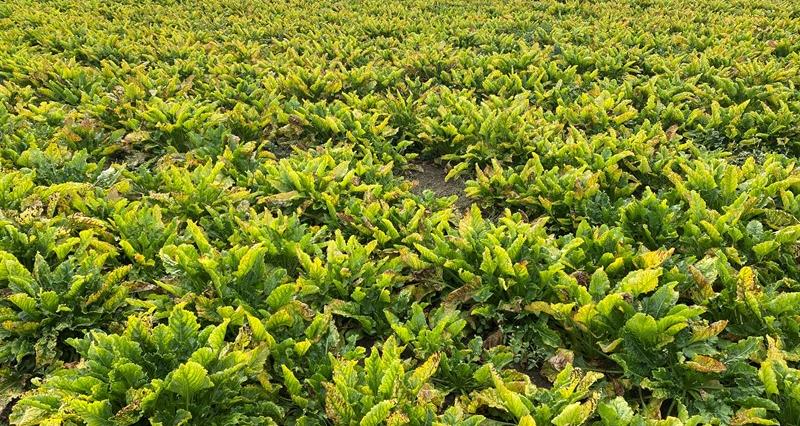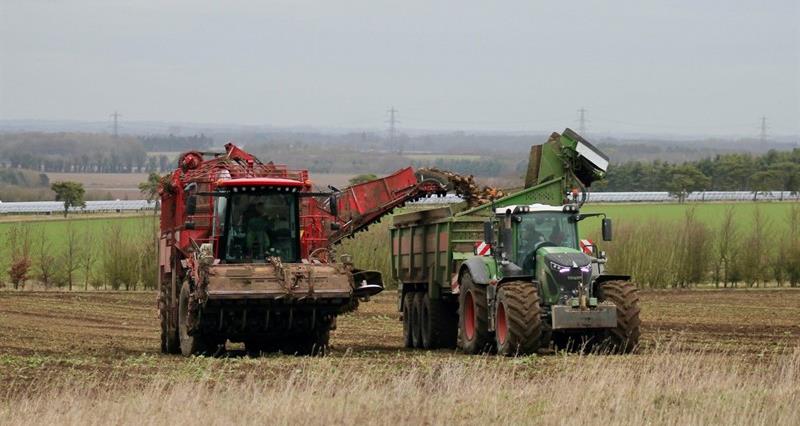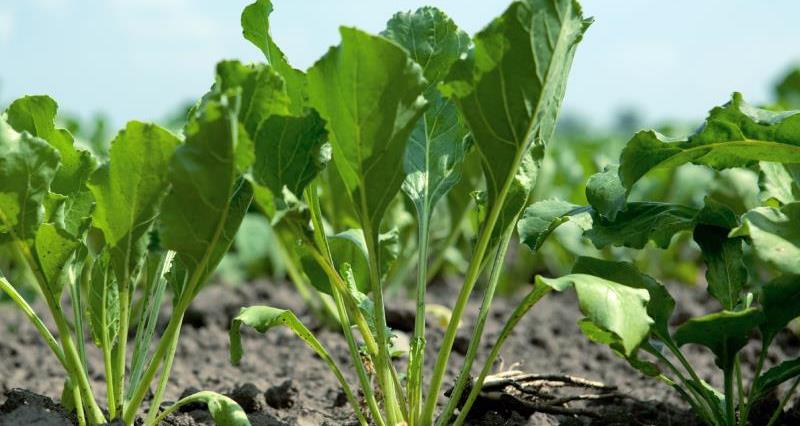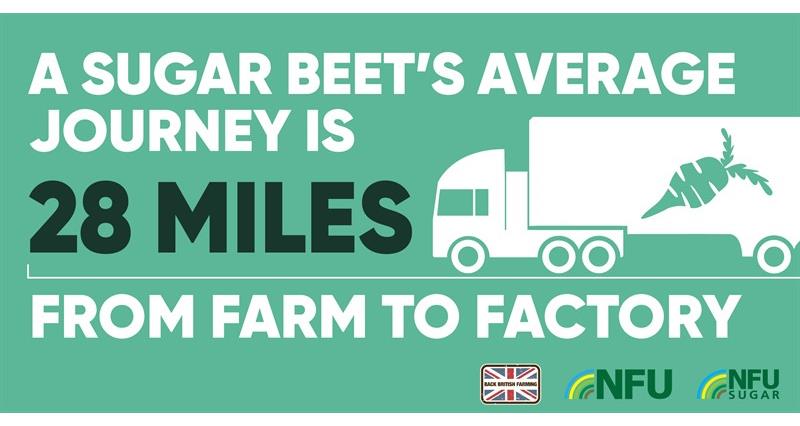The impact of virus yellows on sugar beet
Virus Yellows disease is a complex of three viruses; BMYV (Beet Mild Yellowing Virus), BChV (Beet Chlorosis Virus) and BYV (Beet Yellows Virus).
These viruses are transmitted when aphids carrying the viruses feed on sugar beet. The peach potato aphid (Myzus Persicae) is the main vector.
Infection of sugar beet plants with the yellowing viruses causes chlorosis of leaves, which in turn disrupts photosynthetic, respiratory and other metabolic processes.
These changes increase the levels of amino nitrogen, sodium and potassium in roots, which negatively affects extractability of sugar during factory processing.
Once infected, yellow leaves are susceptible to attack by secondary fungi such as Alternaria alternata, which may destroy the leaf, further exacerbating yield loss.
If a crop is infected with Virus Yellows, the grower can experience up to 50% yield loss, and more if the crop suffers from other diseases, such as Cercospora.
Why is virus yellows disease such a problem in the UK?
Farmers in the UK are more severely impacted by Virus Yellows than growers on the continent due to the maritime climate.
Cold winters are needed to suppress aphid populations. Milder, warmer winters increase the risk of Virus Yellows to the crop, as aphids, which carry the virus, are able to survive over winter and infest the crop more readily come spring.
The year 2020 saw the perfect aphid storm, with a mild winter and an early aphid migration, leading to devastating consequences for some growers.
How have farmers protected their crop in the past?
Historically, farmers have protected their crop by using neonicotinoids seed treatments. These seed treatments protected the crop during the early stages of establishment when it was most vulnerable to aphid attack.
Since 2019, farmers have had no access to neonicotinoid seed treatments and have been limited in the extent to which they have been able protect their sugar beet crops. Foliar sprays offer a certain level of protection during the first 12 weeks of growth. However, many of the active ingredients in these sprays are not being re-authorised for use on farm, leaving growers increasingly unable to manage the threat posed by significant aphid pressure.
In 2020, in the absence of sufficient controls, 38.1% of the national crop was infected with virus, costing growers £43m and subsequently, British Sugar, a further £24m. The 2020 epidemic was caused by early and sustained aphid pressure with the first virus symptoms observed by mid June. Widespread symptom development continued throughout the summer with infection levels ranging between the four factory areas from 7% at Cantley to 61% at Wissington.
Following the catastrophic losses of 2020, NFU Sugar and British Sugar, with valuable technical support from the BBRO (British Beet Research Organisation), applied for an emergency authorisation for the use of Cruiser SB on sugar beet seed for the 2021 crop. The authorisation was sought and approved on the basis that the use of Cruiser SB would only be permitted if the independent, scientifically robust Rothamsted Annual Aphid Forecast projected a particular severity of aphid pressure.
Furthermore, in the event that the use of Cruiser SB was permitted, growers would be bound by a series of conditions to ensure its safe and responsible use such as maximum drilling rates, following crop restrictions, and a requirement to implement a BASIS recommended herbicide programme.
Ultimately, a very cold winter led to a low aphid pressure projection from the Rothamsted Forecast and the use of Cruiser SB was not permitted in 2021.
Similar conditions were attached to the emergency authorisations granted for the use of Cruiser SB on sugar beet seed in the following years (2022 – 2024). In each of these years, the aphid pressure projected by the Rothamsted Annual Aphid Forecast surpassed the threshold set to trigger its use, and seed treatments coupled with timely sprays all contributed to decreasing the incidence of Virus Yellows in the sugar beet crop.
On 23 January, the government rejected the industry’s application for the emergency use of Cruiser SB in 2025.
What is NFU Sugar doing?
In September 2020, the Virus Yellows Taskforce was established between British Sugar, NFU Sugar and the BBRO to accelerate and develop ongoing research into novel controls to limit the future impact of the disease on the UK industry. This group meets government officials and MPs regularly to champion the homegrown sugar industry and seek support towards the development of long-term, sustainable solutions to the disease.
The Virus Yellows Pathway represents the industry’s roadmap to a solution. There is no silver bullet, but there is optimism that an integrated approach of stacked controls will be capable of mitigating the disease risk in the medium to long term.
In September 2020, the Virus Yellows Taskforce was established between British Sugar, NFU Sugar and the BBRO to accelerate and develop ongoing research into novel controls to limit the future impact of the disease on the UK industry. This group meets government officials and MPs regularly to champion the homegrown sugar industry and seek support towards the development of long-term, sustainable solutions to the disease.
The Virus Yellows Pathway represents the industry’s roadmap to a solution. There is no silver bullet, but there is optimism that an integrated approach of stacked controls will be capable of mitigating the disease risk in the medium to long term.
With the technical support of the BBRO, NFU Sugar and British Sugar apply for emergency authorisations for plant protection products (foliar sprays and seed treatments) when they are required in order to ensure that growers retain access to sufficient controls to mitigate the threat posed by the disease.
Following the government’s decision not to grant emergency authorisation for the use of Cruiser SB in 2025, the industry is seeking support for its Virus Yellows Resilience Package, comprising:
- A Virus Yellows resilience fund.
- To scale up Virus Yellows controls trials showing significant promise through the Virus Yellows Pathway, including the use of endophyte grasses, AgriOdorTM repellent scent pellets, and application of coloured dyes to camouflage the sugar beet crop.
- Prioritised approval of next generation sustainable sprays.
- Approval ahead of Spring 2026 of effective new aphicide sprays offering greater and earlier aphid control post plant emergence.
- Trials permit expansions.
- A more enabling, risk-based approach to trials permit considerations, facilitating faster proof of concept of novel controls, such as those supported through the Virus Yellows resilience fund, at farm and landscape level.
- A GIN (Genetic Improvement Network) for sugar beet.
- Drawing upon technical expertise in the East of England to expand Defra’s network of existing GINs.
Partially resistant sugar beet
Growers currently have access to three partially Virus Yellows tolerant sugar beet varieties: Maruscha, Generosa, and Tweed. The three display mild tolerance to one of the three yellowing viruses.
Prior to the introduction of Generosa and Tweed this year, the only partially tolerant variety available to growers was Maruscha – the yields of which in the absence of virus are low compared to existing, elite susceptible varieties. The BBRO calculated, from inoculated trials in 2019 and 2020, that growers would have to sustain 62% infection within fields before Maruscha became economically viable.
Generosa and Tweed represent significant progress for seed breeders’ efforts to cross breed virus tolerant and higher yielding lines, with both performing far better than Maruscha in the absence of virus. Closing this yield gap in the absence of virus is fundamental to the economic viability of widescale adoption of tolerant varieties.
Gene editing will help
The Genetic Technology (Precision Breeding) Act sets out a process for the regulation of GE (gene edited) plant varieties as distinct from GMOs (genetically modified organisms).
Genetic modification involves introducing genetic material from one species of organism into a different species of organism. Gene editing on the other hand, simply speeds up genetic changes that may have otherwise occurred naturally through traditional breeding techniques by making cuts within the genetic material of the same species.
�ʼһ���has welcomed the passage of the Genetic Technology Act and subsequent progress of secondary legislation. UK adoption of new breeding techniques will provide an important opportunity for the sugar beet sector to reduce the impact of pests and diseases, while driving improved yield over time.
With this in mind, British Sugar has invested in a multi-million pound collaboration with agricultural biotechnology company Tropic to explore how gene editing can be used in sugar beet to target Virus Yellows. The project uses Tropic’s proprietary GEiGS® (for gene editing induced gene silencing) technology platform, to make minimal and precise gene edits in sugar beet, enabling the crop to have natural and durable genetic resistance/tolerance.
The John Innes Centre is developing a sugar beet transformation platform which will enable the generation of the GE plants.
NFU Sugar Board chair Kit Papworth said: “Through the correct regulation of gene editing, both the food system and the environment should benefit: the former through improvements in food security, the latter through increasing biodiversity and reducing climate change.”







